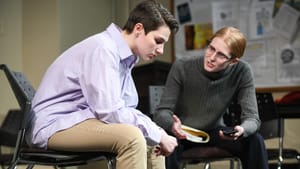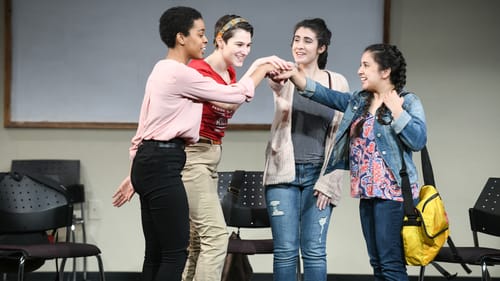Stay in the Loop
BSR publishes on a weekly schedule, with an email newsletter every Wednesday and Thursday morning. There’s no paywall, and subscribing is always free.
Second time around
Arcadia University presents MJ Kaufman's 'Sensitive Guys'

Last week, MJ Kaufman's Sensitive Guys made its college premiere at Arcadia University. But before I get to that, there's this: when I departed InterAct Theatre Company’s professional premiere of MJ Kaufman’s Sensitive Guys on opening night, I felt I had witnessed a failed satire. The play tried to have its laughs and make some serious points, but ultimately buckled under the strain of opposing purposes. Nevertheless, Kaufman’s exploration of female empowerment, male accountability, and college responsibility about campus sexual assault are timely and worthwhile, and Kaufman is a talented young playwright receiving national attention.
Arcadia's production provides a fortunate opportunity for a fresh perspective and the added intrigue of seeing college students perform a play about college students on a college campus. As Kaufman specifies, guest director Rebecca Wright cast only female or nonbinary performers. Here, however, roles were arranged differently: one actor plays all the story’s adults, while the other five each play dual roles as a male and female student.
After the show, I spoke with the cast.
The audience leans in
“Some friends thanked me,” says Hannah Windrim, a sophomore theater major playing both Leslie, who joins a Survivors’ Support Group, and Will, a new member of a Men’s Peer Education Group. “Others said ‘great show’ and questioned me about the issues.”
“I have guy friends who are ‘sensitive guys,’” explains Lara Daigle, a freshman acting major, who plays Katie and Jordan. “It really got them thinking about how they carry themselves and about sexuality.”
“My dad saw it twice,” adds Destinee Gines, a sophomore acting major. “And since, he's stopped interrupting my mother.” People seem to actually learn from the play, she says, “not just that ‘rape is bad,’ but about microaggressions.”
Daigle notes, they’re finding “the play affects everybody — people of whatever gender or sexuality.” This jibed with what I saw on Arcadia’s stage: the characters are played with an earnestness that makes them relatable, even when they do bad things. “The show shows Danny” — played by Janine Silano, a junior acting major — “is a likable guy. Good, normal people can do something that’s not excusable, but they can learn what they did wrong and do better.”
This audience empathy was, in my view, purposely unrealized in InterAct’s production.
College realities
“It’s hard to play characters I disagree with,” says Christina Healey, a senior acting major who plays a female admissions rep and a male professor. In real life, she’s a resident advisor and has found herself in the awkward position faced by Katie, who tells Leslie that anything she says about being assaulted will be subject to mandatory reporting. “I would never want to report anyone,” Healey explains. “The university does nothing; business comes before well-being. I wonder how effective services really are for students.”
“I love Arcadia,” adds senior acting major Brenda Chavarria, who plays Amy and Pete, “but feeling supported emotionally. . . . Well, individuals care, but the top of the university is just in it to make money. Assault is so fucking hard to talk about. The process feels unorganic.”

Windrim adds, “One of the biggest things about being human is having empathy, but the [school] rules put restrictions on that. We’re still teaching ‘boys will be boys’ on all levels.”
Girls will be boys
Kaufman’s requirement that the play’s men be portrayed by women or nonbinary actors not only ensures a manageable cast size — most professional theaters want six actor salaries or fewer — but challenges the cast to play men in a play that's specifically about gender issues. They also must switch roles quickly; at Arcadia, costume designer Constance Case’s work allows quick onstage changes, so performers transform before our eyes. Windrim, who identifies as androgynous and uses plural pronouns, confesses, “they’re the hardest roles I’ve ever done. Neither is concrete. But it’s fun to be someone else.”
The cast laughs about Wright’s first rehearsal exercise, in which they had to walk forward five steps, changing from female to male in the space of 10 feet. They discovered that broad strokes such as “manspreading,” the male habit of opening the legs past a seat’s width and crowding others, weren’t enough. “Maintaining the voice,” Gines adds, is particularly challenging; the cast employs lower registers for their male characters that don’t sound forced or unnatural. They all observed that male body language, according to Gines, “opens up more.”
Daigle realized she connected with her character Jordan, who suffers a breakup with Tracy. “Men can be victims too,” she says. “Women are not the only victims.” Moreover, she adds, “being a victim is not what defines you.”
Of her role as Danny, Silano shares that “gay guys have said, ‘you’re really hot,’” vindicating her maleness in the role.
Reluctant comparisons
Wright took the cast to see InterAct’s production. Unanimously, they were surprised by the laughs. “They caught me off guard,” says Daigle. They were still in rehearsal and hadn’t had their own audiences, but also were developing a more sensitive, earnest style. Windrim adds, “The laughter here has been warming, humane.”
While I didn’t want to compare Arcadia’s production to InterAct’s, I confessed that I found the students more believable, their characters’ agonizing awkwardness — as they strained to say and do the right things — sympathetic rather than satirical. “For us, it’s more immediate,” Windrim says. “We leave the theater and go to class.” It’s their world.
My takeaways from the adventure include a new appreciation for Kaufman’s work — but also an awareness that Sensitive Guys may play best on college campuses, where both its performers and audience must regularly navigate the play’s risky issues.
What, When, Where
Sensitive Guys. By MJ Kaufman, Rebecca Wright directed. Arcadia University Theater Department. Through February 18, 2018, at the Arcadia Little Theater, Spruance Fine Arts Center, 450 S. Easton Road, Glenside, Pennsylvania. (215) 572-2112 or arcadiautheater.ticketleap.com/sensitive-guys.
Sign up for our newsletter
All of the week's new articles, all in one place. Sign up for the free weekly BSR newsletters, and don't miss a conversation.

 Mark Cofta
Mark Cofta